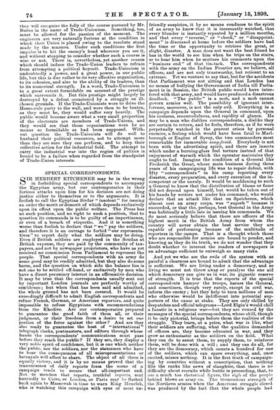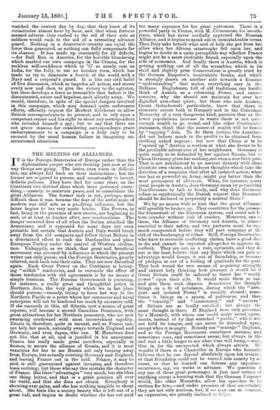SPECIAL CORRESPONDENTS.
SIR HERBERT KITCHENER may be in the wrong in forbidding special correspondents to accompany the Egyptian army, but our contemporaries in their furious attacks upon him for his decision are not doing justice either to themselves or to the arguments. It is foolish to call the Egyptian Sirdar " insolent " for issuing an order the merit or demerit of which depends exclusively upon its effect upon the public welfare. The Press has no such position, and no right to such a position, that to question its commands is to be guilty of an impertinence, or even of a breach of etiquette. And it is something worse than foolish to declare that " we " pay the soldiers, and therefore it is an outrage to forbid "our representa- tives" to report daily what the soldiers may be doing. Even if British soldiers are employed in the Soudan at British expense, they are paid by the community of tax- payers, and not by newspaper proprietors, who have as yet received no commission from Parliament to represent the people. That special correspondents with an army do some good may be readily admitted, but they also do some harm, and the question on which side the balance lies is not one to be settled off-hand, or exclusively by men who have a direct pecuniary interest in an affirmative decision. It may be true that the correspondents usually sent out by important London journals are perfectly worthy of conadence ; but when that has been said and admitted, the whole ground has not been covered. It would be exceedingly difficult to admit English correspondents and refuse French, German, or American reporters, and quite impossible to refuse Egyptians with recommendations from the Khedive. Are our contemporaries prepared to guarantee the good faith of them all, or -their judgment, or their freedom from a desire to set one portion of the force against the other? And are they also ready to guarantee the host of " international " telegraph clerks, postmasters, and editors through whose hands the correspondents' communications must pass before they reach the public ?. If they are, they display a very noble spirit of confidence, but it is one which neither the-public, nor the soldiers, .or the statesmen who have to bear. the Consequences of all misrepresentations or betrayals will affect to share. The object of all three is equally victory, and it is by no means proved that the transmissiou of daily reports from the scene of a campaign tends to secure that all-important end. Not "to 'mention that reports, truthful reports, sent hurriedly to Cairo, or London, or Paris may be flashed back again toMassowah in time to warn King Menelek, who is watching this campaign with eyes of most un- friendly suspicion it by no means conduces to the spirit of an army to know that it is incessantly watched, that every blunder is instantly repeated by a million mouths, and that every "reverse," or "check," or " disappoint- ment" is discussed at home before the soldiers have had the time or the opportunity to retrieve the great, or slight, disaster. A man does not want the best friend he has in the world to see him when he trips on the stairs, or to hear him when he mutters his comments upon the "business end" of that tin-tack. The correspondents with the army on the Indian Frontier are, we believe, all officers, and are not only trustworthy, but reticent to an extreme. Yet we venture to say that, but for the accidents that Parliament was not sitting and that London has no means of bullying the Government of India till Perlis, ment is in Session, the British public would have inter- fered with that army, and would have produced a disastrous deadlock. "The public" is a mob, and a mob cannot govern armies well. The possibility of ignorant inter- ference, moreover, is not the only evil. Everything in a campaign depends upon the General in command, upon his coolness, resourcefulness, and rapidity of glance. He may be a man who dislikes correspondents, a dislike they are certain to return' and he feels, therefore, as if he were perpetually watched in the gravest crises by personal enemies, a feeling which would have been fatal to Marl- borough or Eugene of Savoy, the two commanders most remarkable for immovable sang-froid. Everybody is not born with the advertising spirit, and there are insects which under a burning-glass feel torture instead of that enjoyment of warmth which the operator maintains they ought to feel. Imagine the condition of a General like Frederick the Great, whose main business during three years of his campaigning life was to repair defeat, with fifty " correspondents " in his camp reporting every disaster, every preparation, and every execution of the in- competent or the unruly. It would be maddening to such a General to know that the distribution of blame or fame did not depend upon himself, but would be taken out of his hands by writers not under his command, who would declare that an attack like that on Speicheren, which almost cost an army corps, was " superb " because it succeeded, or that the, perhaps, best General in the Army was habitually a little late in issuing his commands. We do most seriously believe that there are officers of the highest merit in the British Army from whom the country will never obtain the best service they are capable of performing because of the multitude of reporters in the camps. That is a thought which those who are responsible for armies are bound to ponder, and knowing as they do its truth, we do not wonder that they doubt whether to interest the readers of newspapers is an advantage sufficient to outweigh so many risks.
And yet we who see the evils of the system with so painful a clearness are bound to admit that the advantage is sufficient. We are living under a democracy, and so living we must not throw away or paralyse the one aid which democracy can give us in war, its gigantic reserve of strength. It is true that the reports of the special correspondents hamper the troops, harass the General, and sometimes, though very rarely, except in civil war, inform the enemy ; but they help to turn millions of men who otherwise would be indifferent into potential sup- porters of the cause at stake. They are only chilled by despatches and official telegrams—Lord Elgin's would chill a fanatic in a religious war—but they are roused by the messages of the special correspondents, whose skill, though it be only pictorial, brings before them the realities of the struggle. They learn, at a price, what war is like, what their soldiers are suffering, what the qualities demanded of officers are, they become educated in war, and they grow as enthusiastic as the soldiers on the field. What they can do to assist them, to supply them, to reinforce them, will be done with a will ; and they can do all, for they are the democracy, which counts a hundred for one of the soldiers, which can spare everything, and, once excited, misses nothing. It is the first truth of campaign- ing by countries without a conscription, that nothing fills the ranks like news of slaughter, that there is no difficulty about recruits while battle is proceeding, that, to use a much too rhetorical figure, the sigh of the people behind blows an army on. The tremendous strength of the Northern armies when th,e American struggle closed was produced by the fact that the whole people had watched the contest day by day, that they knew of its vicissitudes almost hour by hour, and that when fortune seemed adverse they rushed to the aid of their side as soldiers would rush to the aid of a retreating advance guard. Nothing in a democratic country can equal the force thus generated, as nothing can fully compensate for its absence. It has made up constantly for all defects, —for Bull Run in America, for the horrible blundering which marked our own campaign in the Crimea, for the reckless self-confidence which in '57 so nearly cost us India, for the folly, to use no harsher term, which has made us try to dominate a fourth of the world with a Navy and a corporal's guard. It is like our civil habit of free discussion, which so impedes all action, and seems every now and then to give the victory to the agitator, but then develops a force so irresistible that before it the discontented, aware and hopeless, melt silently away. We would, therefore, in spite of the special dangers involved in this campaign, which may demand quite unforeseen efforts, officially request Sir Herbert Kitchener to allow British correspondents to be present, and to rely upon a competent censor and his right to shoot any correspondent who revealed himself a spy; but to say that there are not grave reasons for considering correspondents grave embarrassments to a campaign is a folly only to be excused by the usual human failure in imagining un- accustomed situations.



































 Previous page
Previous page